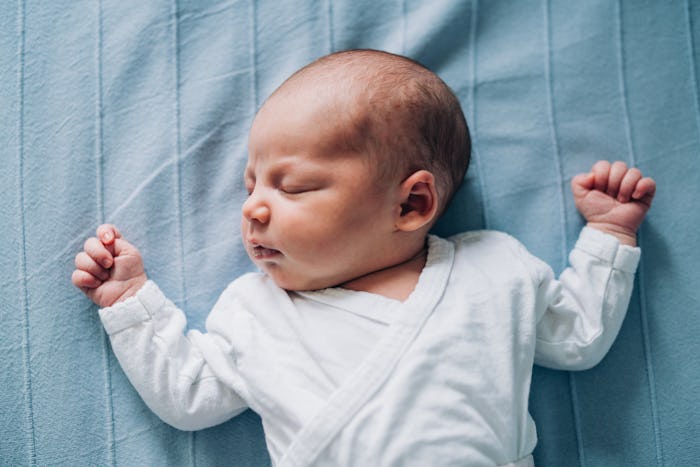Life

Can Babies Become Dependent On White Noise? An Expert Explains
New parents will try just about anything to get their baby to sleep through the night. Pacifiers, swaddling, you name it — a stressed out parent has given it a go. Even white noise, which often works for adults, is a crutch for some sleep-deprived families. But are there any down sides? Is it possible that babies could become dependent on white noise? Guys, it works like a charm, I don't even know if we want the answer.
In an email interview with Romper, Dr. Harvey Karp, pediatrician and author of the best-selling parent guide Happiest Baby on the Block, wonders if we should, in fact, rethink the question. "We all use cues to help us fall asleep," he says. "And there’s a lot of confusion about what sensations we can give babies without making them 'dependent.' Babies do learn and have expectations that things will be the same every night, and babies are dependent on sound as soon as they are born. That’s because in the womb they get constant sound that’s as loud as a vacuum cleaner! In fact, to put a baby to sleep without white noise is really jarring for them," Karp asserts.
OK, so suggesting that sleeping without white noise is why babies don't sleep well really turns this whole conversation on its head. Quick sidebar: I must admit, despite delivering two children, I did not know that I had a built-in white noise machine within my womb.
Dr. Karp adds, "Worrying that a baby is going to become dependent on white noise is like worrying that an adult is addicted to sleeping on a bed or with a pillow. I’m guessing that you’re so dependent on beds and pillows that when you go to a hotel, you only go to hotels with beds and pillows. Is that ruining your life? Probably not. If I told you to sleep on the cold, hard, cement floor without a pillow and a bed, you probably could, but you wouldn’t like it. So with babies and kids, let’s give them the sensations that will help them sleep that they’re used to already and will make them happier—and help you sleep, too."
In terms of dependency and length of time your baby should need white noise, Karp does suggest on his website, "Don't use white noise all day long. Hearing normal home sounds, for many hours a day, will help your child master the nuances of all the interesting sounds around her, such as speech, music and so forth." Additionally, the volume of your white noise machine or app should also be monitored. In a 2014 study, the American Academy of Pediatrics (AAP) tested 14 white noise machines designed for infants and found that all of them exceeded recommended noise limits, which is set at 50 decibels. As such, pediatricians recommend that any white noise machines should be placed at least 7 feet away from your baby, and volume should be below the maximum volume setting.
With that in mind, and now that we've established that white noise can indeed help baby sleep through the night without becoming dependent, what happens next? What are the best white noise apps or products for baby? While the Dohm Classic hits high marks, according to VeryWell Family, there are plenty of options out there to suit your needs, at a variety of price points. Cheers to all that sleep you're going to be getting real soon.
Study referenced:
Hugh S, Wolter N, Propst E, Gordon K, Cushing S, Papsin B. (2014) Infant Sleep Machines and Hazardous Sound Pressure Levels. Pediatrics, https://pediatrics.aappublications.org/content/early/2014/02/25/peds.2013-3617.
Expert:
Dr. Harvey Karp, pediatrician and author of the best-selling parent guide Happiest Baby on the Block